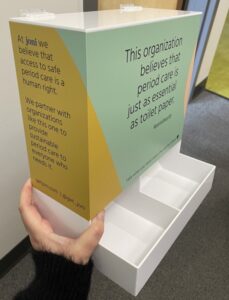An initiative to supply free menstrual products in bathrooms on campus has been met with delays, causing concern from those involved.
Camosun College librarian Robbyn Lanning started Going With the Flow in 2019; in March of that year, she received a $5,000 grant from the college for the initiative. However, there has been some concern after Going With the Flow was passed along through departments. Many bathrooms are currently without free products, and the initiative’s launch has had to be delayed.
The project came to a bit of a standstill during the COVID-19 pandemic, when the campus closed. Lanning attended a meeting with several college executives in August of 2021 where she urged for action, including the implementation of dispensers. This implementation was handed over to Camosun’s Facilities department. In October 2022, Facilities put up the dispensers; that same month, they fell off and broke.
“To my knowledge, I am aware that some were installed incorrectly and were broken and fell,” says Lanning. “And, to my knowledge, I haven’t seen things all filled and accessible in the way that I would have expected.”
Camosun director of Facilities Julie Oakley says that the department has a new implementation method planned after the double-sided tape they used caused the dispensers to fall and break.

“They fell down and they broke,” says Oakley. “So, we needed to order more. Most plexiglass-type items are secure enough to hang with double-sided tape; we have other dispensing machines that are hung that way. We’ve devised a solution where we’re going to put them on a stand when we get the replacement ones. [The dispensers] were actually in rooms that had tile that could chip and break where you’d have the whole tile break off, in the new CHW [Alex and Jo Campbell Centre for Health and Wellness] building specifically, and we didn’t want to drill holes into the tile to damage the tile, so we chose to double-side tape them. Clearly, that didn’t work.”
Also, there were concerns about the late start of the implementation of the dispensers. Lanning wanted the dispensers to be installed before the fall 2022 semester started, and they weren’t, so she took her concerns to others at the college.
“I identified some concerns,” says Lanning, “and then advocacy was happening at a higher level than me because I’m, you know, just the librarian.”
Oakley says that the college maintenance staff was busy getting ready for the fall semester.
“There was a bit of delay in getting things installed in the fall as well because our back-to-school timeframe for our maintenance staff is significantly busy,” says Oakley, “because there are lots of operational-like critical requests that have to happen. And they take precedent. So, I sent out a message kind of early September and said, listen, we’re focusing on operational critical, and we’ll get to the other ones in October.”
In the beginning of the Going With the Flow initiative, Lanning suggested six bathrooms on each campus carry dispensers. Oakley says the plan now is to have every bathroom on both campuses supplied with dispensers and free products before September 2023. Oakley says this will turn from a project into daily maintenance for Facilities.
“Our intention is then to make every single menstrual product dispenser free, so every bathroom will have free menstrual products,” says Oakley.
Lanning says that having environmentally friendly products, free from harsh chemicals, is very important to her.
“Going With the Flow started out as a Creativity and Innovation Grant that I applied for to bring free menstrual products that were healthy for students to use, environmental in their impact, much less waste not using bleaches or cotton production, all sorts of things,” says Lanning. “But really, to empower menstruating people… with a safe and supportive environment, so they can focus on their education rather than worrying about the need to buy menstrual products.”
